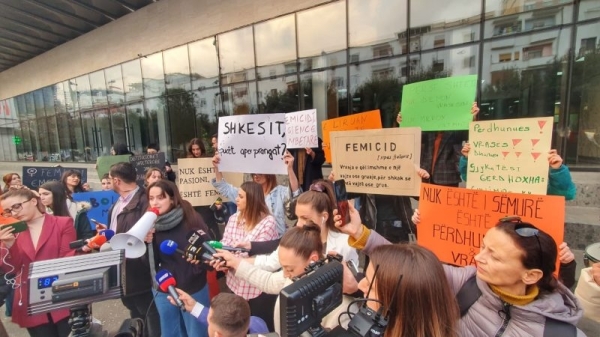Albanians protest over triple femicide by convicted rapist, murderer

Crowds of activists and members of the public, including women and children, gathered outside of the Albanian Ministry of Justice on Thursday evening to protest over the murder of three women by a man with a long history of rape, domestic violence, and femicide.
On Wednesday, the accused, Dan Hutra, seized an AK-47 and shot an injured woman on the street before going to the apartment of his former co-habitant, where he killed her sister and her brother’s fiance. He attempted to kill three others, including his ex, but they survived. Hutra then went to another apartment, where he shot and murdered another woman.
The accused then went on the run for several hours before being apprehended by the police. In his testimony to the police, he said he planned to kill four people and then turn himself in.
The accused has previous convictions for raping his sister-in-law and taking another woman hostage and was sentenced to two years in prison in 2003. In 2007, he murdered his ex-wife by stabbing her in the heart and liver and was sentenced to 16 years. In 2022, he was arrested twice for burglary and domestic violence against his co-habitant, spending just a few months in prison. He was released on 16 February and committed the triple murder less than two weeks later.
Protestors were furious that the accused had a long criminal rap sheet and was clearly a danger to women, yet was allowed to be released after relatively short sentences.
“Women and mothers are the cream of a nation. If we take it by tradition, in the Kanun [a traditional set of feudal laws and rules in Albania], when a woman is killed, she is counted as two people. That murderer, when he killed the first woman, should have been sentenced to 50 years in prison,” said activist Arben Kola.
Protestors held placards with slogans such as “I am three years old, 23 Albanian women have been murdered in my lifetime”, “Women just wanna live without fear of being murdered”, “women are killed, the state is silent” and “femicide is a national emergency.”
They called into question the integrity of the judges who judged on previous cases against the accused, claiming corruption and a failure to carry out their duty.
“Today, we are faced with a murderer who committed a crime that could have been avoided. He killed his first wife and raped another, and the police didn’t know he was dangerous? How is it possible that the institutions have failed to protect the lives of these women? We must talk about the fact that we have normalised violence, and we consider femicide normal. It is not a crime of passion but the murder of a woman,” another activist told the crowd.
In Albania in 2022, some six women were murdered by a current or ex-partner, 4,000 more denounced domestic violence against them and some 150 protection orders were sought, according to official data, a decrease from 2021 but still a cause for concern.
A total of 23 women have been murdered by a former partner or family member since 2019 in a country of 2.7 million.
Over 53% of Albanian women will suffer at least one form of domestic violence at least once in their life, while femicide increased by 13% in 2021, and more than half of Albanians surveyed by the UN in 2019 thought that women “should tolerate some violence to keep her family together”.
But the issue of femicide is not just limited to developing or non-EU countries. In 2022, mass protests took place in France after the murder of three women on New Year’s Day, with protestors condemning the government for lack of action. I
In Germany, femicide has been described as “a silent epidemic” as it has one of the highest rates in Europe. Austria has also seen an increase in domestic violence and the murder of women by men.
A January report from the European Institute for Gender Equality made several recommendations for the European Commission to tackle gaps in addressing femicide in the EU. These include developing legal standards to protect women and advance their rights, strengthening member states’ rights frameworks, providing funding, and doing more to help children orphaned by femicide.
Albania is currently an EU candidate country, having opened the formal accession process in summer of 2022.
At the Albanian level, another protestor said, “All state ministries need to be mobilised for a national platform against femicide. Let’s go out on the streets again for March 8- we will also march on 8 March for a just life and without violence…we don’t want to mourn the women of this republic anymore.”
(Alice Taylor | EURACTIV.com)



